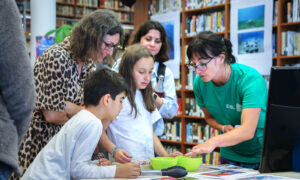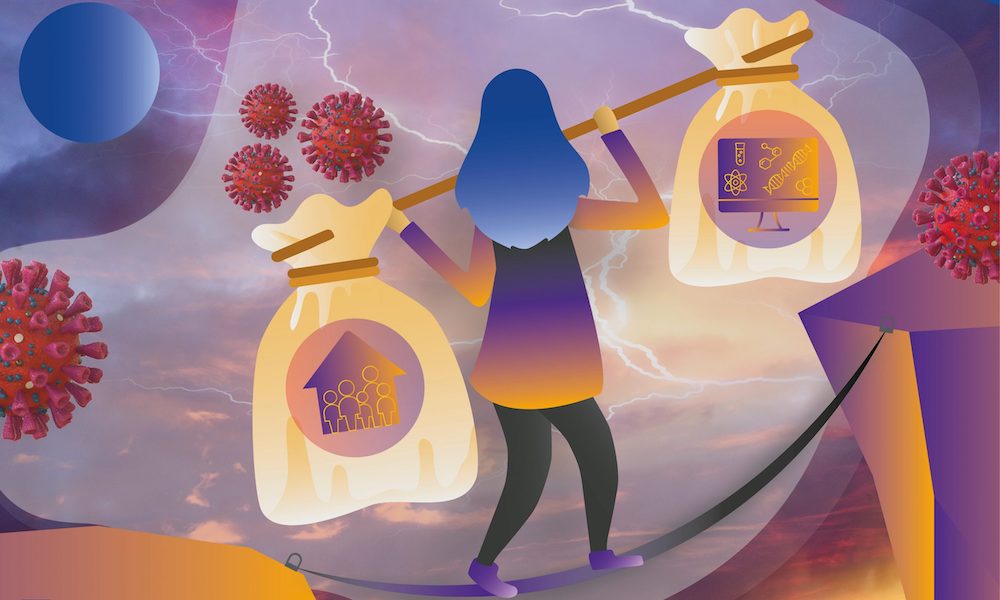
Indirect impacts of a pandemic on women in science
EMBL conference addresses ways to keep ‘boats’ afloat in COVID-19 storm

On 9 September, EMBL hosted a conference to discuss the indirect impacts of the coronavirus pandemic on women in science. As one of the speakers noted, the pandemic has been a torrential storm. But individual differences in people’s ability to weather this storm ultimately come down to a long list of factors like work and family responsibilities, available support, and career stage.
“It’s the same storm, but with different boats,” said Roni Wright, a postdoc at the Centre for Genomic Regulation (CRG) in Barcelona, paraphrasing a poem written in April by British writer Damian Barr. “The way we experience this pandemic, the way that we manage it and how we get out of it is going to be very different, depending on the boat we find ourselves in.”
Through the course of the day-long conference, this theme of varying boats and significantly varying situations was an ever-present thread interwoven between talks and participant interactions.
Before the conference even began, it was clear this topic resonated with women in science, who accounted for 88.3% of the approximately 1329 people (75 nationalities) who registered. Participants got involved with questions, tweets, and interactions on multiple Slack channels, where they could swap stories and advice.
In addition to creating awareness of how the pandemic is affecting different groups, organisers also aimed to glean best practice from various institutions and start a conversation on the issues.
The conference began with personal stories from a research group leader who is a single mother (Aki Minoda from the RIKEN Center for Integrative Medical Sciences in Yokohama, Japan); a research assistant and woman of colour (Oluwaseun Ogundele from the Wellcome–MRC Cambridge Stem Cell Institute at the University of Cambridge, UK); and a postdoc and mother of three (Roni Wright).
Their stories showed the unique trials they each faced, but also the shared uncertainty about the future of their careers and concern for maximising their time away from the workplace, and for Aki and Roni a constant questioning of how best to parent in these unique circumstances.
They were all quick to point out the two sides of the coin in this situation. There were positives like spending more time with family for the mothers or getting caught up on professional reading. The downsides, however, were the setbacks in their research and the challenge of finding ways to make best use of their time, so the pandemic didn’t represent entirely lost time in their career paths.
“The way to cope was flexibility so you bend and not break,” Roni said. “I’d have to prioritise the most important tasks for when the kids were asleep. It took more planning.”
Ultimately, they each found lessons they could share in their talks: accept that there’s only so much you can do in a day; make smaller, achievable goals; find ways to still network and interact with other scientists to minimise isolation; prioritise tasks both for family and work, and keep your priorities realistic.
Strategies to minimise impact
The next part of the conference explored what can be done to minimise the impact of COVID-19 on women in science, both at the individual level – including techniques for relieving stress such as meditation and mindfulness – to more macro levels of policymaking and evaluation of more deeply rooted, systemic gender disparity.
Geneviève Almouzni, from the French National Centre for Scientific Research (CNRS) and Institut Curie, began this section by sharing the progress made in gender equality since 2008, when a European Research Council working group was established. Her talk included COVID-related career strategies, especially for leadership, such as advocating for extensions of deadlines, being flexible with teams, and making accommodations for parent scientists or others facing unique pandemic-related challenges. She also included small ways for women and others to build awareness of COVID-19 time-management issues among colleagues and scientific peers, such as inserting a slide in presentations or adding a line to their email signature.
Helen Ochuko Kwanashie, a professor of pharmacology at Ahmadu Bello University, Nigeria, and a member of the Organization for Women in Science for the Developing World, noted that women worldwide tend to be at a greater disadvantage in crises compared to men. And, while COVID-19 has shone a spotlight on the imperfect equality, diversity, and inclusion efforts in the workplace in developed countries, this situation is heightened for women in developing countries and requires remedial measures, including clear policies.
Quoting largely from The Times Higher Education Blog of 15 May, she said, “Women in science are battling both COVID-19 and societal patriarchy. The pandemic has worsened longstanding gender and other inequalities in science. Even in non-pandemic times, women academics face disparity for several reasons.”
The final speaker in this section of the conference was Jessica L. Malisch, Assistant Professor of Physiology at St. Mary’s College of Maryland, US. She brought together 16 collaborators to highlight gender issues in academia during the pandemic and to offer solutions, ultimately publishing the opinion piece ‘In the wake of COVID-19, academia needs new solutions to ensure gender equity’ in PNAS. The article notes how women generally must take extra measures to advance, and points out how diversity isn’t just about fairness, but about producing the best science.
“During times of crisis, biased decision making prevails. Now is not the time to put equity off till later,” Jessica said. “We must act now to ensure equity post-COVID-19.”
Looking to leadership
The last part of the meeting included talks from Ana Maria Franchi, President of Argentina’s National Council for Scientific and Technical Research (CONICET), and from EMBL Director General Edith Heard.
In her talk, Ana Maria noted that an epidemic of violence against women compounds other impacts from COVID-19. She also spoke about how governments need to enact policies that alleviate negative effects women have experienced, both during the pandemic and more generally.
Edith’s presentation focused on EMBL’s response to the COVID-19 pandemic, and included other initiatives that EMBL has embarked on to promote diversity in European science. These initiatives include LEAP (Leadership and Excellence for Aspiring Postdocs) and Helping Hands, two new programmes designed to empower female scientists to take leadership positions in industry and academia.
“We have to be proactive and pre-emptive,” Edith said, reminding the crowd of another EMBL conference in October that will explore how gender roles impact research. “There will be an economic crisis, and the first people to suffer will likely be women. My advice is to put your gender glasses on now more than ever.” As the conference came to a close, the Slack channels were still buzzing, with participants swapping email addresses and continuing to post items like this one from a male participant who couldn’t attend the full conference. “Family calls. But I wanted to say thank you – I realise that it’s inequity that has brought us here today, but despite (or because of?) that you’ve managed to provide a very caring and thoughtful space that was a pleasure to join.”
Related links
- Women in Science COVID-19 impacts conference web page
- Upcoming EMBO/EMBL/HHMI conference, "Gender roles and their Impact in Academia - Virtual," 13-15 October
- Upcoming virtual ERC event, "Sex and gender dimension in frontier research," 16 November
- PNAS article: ‘In the wake of COVID-19, academia needs new solutions to ensure gender equity’
- European Commission Action Plan
- The impact of sex and gender in the current COVID-19 pandemic by Sabine Oertelt-Prigione
- YouTube recordings from conference sessions


